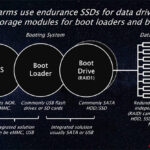 ATP Electronics has announced the launch of S600Sia, its first 3D triple-level cell (TLC) flash-based A1 Performance Class SD and microSD cards built for industrial and automotive applications.
ATP Electronics has announced the launch of S600Sia, its first 3D triple-level cell (TLC) flash-based A1 Performance Class SD and microSD cards built for industrial and automotive applications.
ATP employs 64-layer 3D NAND technology, which is standing out to become the mainstream of the automotive and industrial market with steady supply for 5 years. By scaling vertically, 3D NAND mitigates reliability concerns that came with planar NAND’s shrinking lithography.
The 3D TLC-based S600Sia memory cards undergo endurance, data retention and wide temperature tests from IC to drive level. They are certified according to ISO, JEDEC, automotive-specific standards and temperature-related standards such as AEC-Q100/AECQ-104. Depending on the project and customer requirements, ATP can also conduct customized testing, such as compliance for ISO 16750.
Aside from supporting wide operating temperature ranges from -40°C to 85°C, ATP S600Sia SD/microSD cards undergo extensive cross-temperature tests and implement temperature-related variables and mechanisms to enhance drive integrity. Dynamic Self-Recovery Calibration enables the SD/microSD to adapt to various temperature modes through a combination of firmware and hardware solutions.
ATP 3D TLC SD/microSD cards feature 4KB page management and SLC caching algorithm, which allows 1/2 random access time and low latency compared with a traditional solution. These cards can reach Android A1 application performance (SDA spec) and consume less power, making them suitable for small handheld devices with limited battery life.
S600Sia SD/microSD cards come in capacities of up to 256 GB, offering significant reductions in cost per GB. They meet increasing data storage needs and offer portable convenience for backup, edge computing, event data recording and map navigation with or without an Internet connection.


Leave a Reply